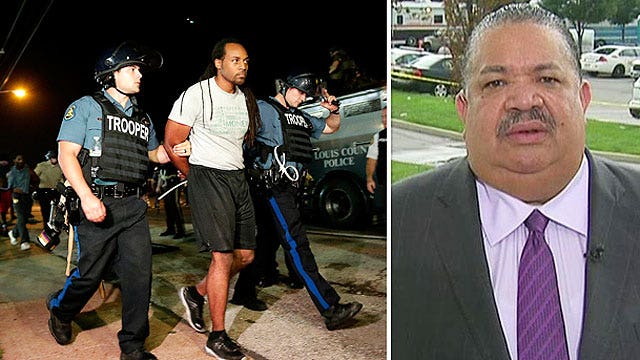Some of the greatest abuse stemming from the situation in Ferguson is not coming from the hands of law enforcement officers but from the mouths of ministers who are exploiting this situation to advance their own agendas rather than bring healing to a community and nation torn apart by racial division.
I’m not only referring to pastoral provocateurs such as Al Sharpton who is spear-heading an “Anti-Police Rally” this weekend or Jesse Jackson who has been roundly criticized for using the Ferguson chaos to raise funds for his church.
White ministers throughout the country are also using the unrest in Ferguson to either score points with segments of their congregation by demonstrating how racially sensitive they are or to deal with their own angst over “white privilege.”
[pullquote]
However, those of us who are pastors have a responsibility in situations like Ferguson to be place the needs of others above our own—and that means speaking God’s truth to those who are confused, hurt, and bitter. Instead of being concerned about political correctness, pastors should be more concerned with being biblically correct.
There is no greater service we can perform than to speak truth to people, regardless how unpopular or politically incorrect that truth is.
I want to suggest two complementary principles from the pages of Scripture that pastors might consider sharing with their congregations on Sunday if they feel compelled to address the Ferguson situation.
First, the Bible affirms that law enforcement officers are “ministers of God . . . an avenger who brings wrath on the one who practices evil” (Romans 13:4).
In that same verse the Apostle Paul also says that God has granted to such authorities the right to “bear the sword, ” referring to the taking of a life if necessary.
Shouldn’t we be fearful of officers who wield that kind of power? Paul answers, “For rulers are not a cause of fear for good behavior, but for evil. Do you want to have no fear of authority? Do what is good and you will have praise from the same” (Romans 13:3).
Does that mean that police never commit acts of injustice? Of course not.
Even Paul himself was beaten, imprisoned, and ultimately executed unjustly by government authorities. But the very real abuse perpetrated by a few police officers is the exception rather than the rule---which is why it makes headlines.
While there are certainly some rogue officers (just like there are rogue pastors), the majority of policemen are overworked and underpaid servants of both their communities and of God.
Pastors should speak in such a way as to engender respect for, instead of mistrust of, law enforcement officials.
But pastors also need to address the reality of mistreatment in our world that may come from the hands of a law enforcement officer, an employer, a parent, or a mate.
We do our congregations no favor when we give them the illusion that they can sail through life without ever being treated unjustly or hurt deeply.
Perhaps Michael Brown’s death in Ferguson was unwarranted, or maybe police officer Darren Wilson is the true victim. We don’t know all the facts yet.
But what we can say with certainty is that every one of us will at some time experience injustice.
Revenge never brings healing. As someone said, “The problem with the ‘eye for an eye’ and ‘tooth for a tooth’ principle is that eventually everyone winds up blind and toothless.”
The most powerful antidote for the inevitable offenses we will all experience at some time is forgiveness: letting go of my desire to hurt someone for hurting me.
Contrary to what some people believe, forgiveness is not surrendering our desire for justice but our desire for vengeance. Forgiveness means allowing someone else to exact justice on our behalf.
The true victims in Ferguson—whoever they are—can know that even if a jury fails to render a fair verdict, God will ultimately settle the score.
Sharing these two biblical principles may be hurtful to some at first, but they are key to resolving the unrest over Ferguson.
Pastors, as well as all believers, should remember that the truth of God’s Word is like a surgeon’s scalpel that has to wound before it can heal.

